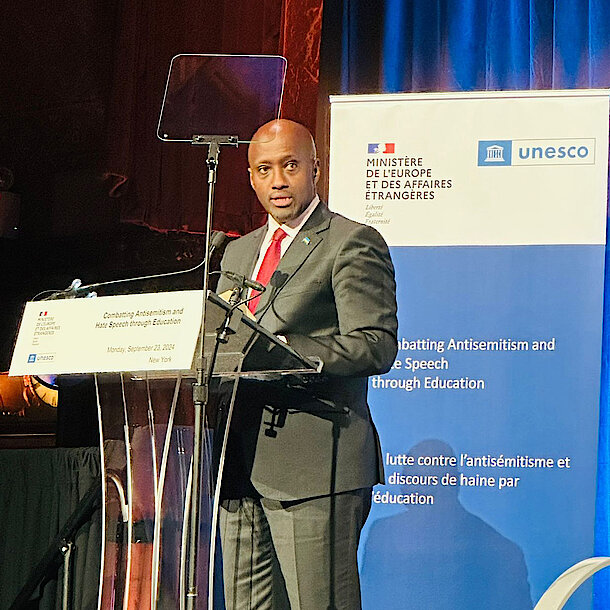
Rwandan Minister of Foreign Affairs Olivier Nduhungirehe
The Rwandan Minister of Foreign Affairs Olivier Nduhungirehe participated in a high-level event on the fight against antisemitism and hate speech through education
Titled “Combatting antisemitism and hate speech through education”, it was organized by France and UNESCO on the sidelines of the 79th UN General Assembly in New York.
In his remarks, Minister Olivier Nduhungirehe shared Rwanda’s experience in leveraging civil education to combat hate speech and division.
He also stressed the need to collectively fight the rise in hate speech in the Great Lakes region, particularly in DRC, “where the Congolese Tutsi population continue to face violence and are forced to flee their homes because of who they are.”
He said that the current situation in DRC reminds Rwanda’s own history, marked by the 1994 genocide against the Tutsi in Rwanda when hate speech played a central role in mobilizing perpetrators to commit violent acts.
Below his full speech
“Let me begin by expressing my sincere appreciation to the organizers of this important event on combating antisemitism and hate speech through education. It is a topic of global urgency, which requires our attention and coordinated action.
Hatred is not inherent to humanity; it is learned, through extremist ideologies and the dehumanization of others. That is why positive, inclusive and tolerant education is crucial to ending hatred in all its forms. This is especially true in our region, where anti-Tutsi hate speech has reached alarming levels, particularly in Eastern DRC, where the Congolese Tutsi population continue to face violence and are forced to flee their homes because of who they are.
The current situation reminds me of my country’s own history, marked by the 1994 Genocide against the Tutsi in Rwanda. Thirty years ago, hate speech played a central role in mobilizing perpetrators to commit violent acts. The Genocide resulted from decades of institutionalized anti-Tutsi hatred, evidenced by discriminatory policies and widespread propaganda in school and religious institutions.
After the Genocide, the first step toward reconstruction was fostering national unity. This was achieved by reforming the education system, eradicating hateful narratives and teaching future generations to see each other as Rwandans first. Education became a pillar of Rwanda’s national unity and reconciliation process.
Allow me to share a story of heroism that occurred in Nyange, Western Rwanda, 3 years after the Genocide in 1997. Armed militia men attacked a school seeking to kill Tutsi children, but their classmates stood united, refusing to separate. They declared, “we are all Rwandans”, and were killed for this act. Today, these brave students are commemorated as national heroes – a true testament to the power of teaching the values of unity from a young age.
Beyond formal education through the national curriculum, Rwanda has put in place grassroots initiatives and community dialogues to raise awareness on the dangers of hate speech. Our efforts included a systematic retelling of the facts of the Genocide through survivor testimonies to the youth, which account for 70% of the population. In addition, through platforms like Itorero, a national civic education program, Rwanda equips its youth with the tools to reject and fight all forms of hatred.
I will conclude by stressing that combatting hatred must also include combatting denial, which remains the breeding ground for dangerous ideologies. In today’s digital age, misinformation
fuels denialism. It is our collective responsibility as civil society, media and the international community to give no space to deniers and their falsehoods. Instead, we must place education at the center of our combined efforts.
I thank you for your kind attention.” (End).
